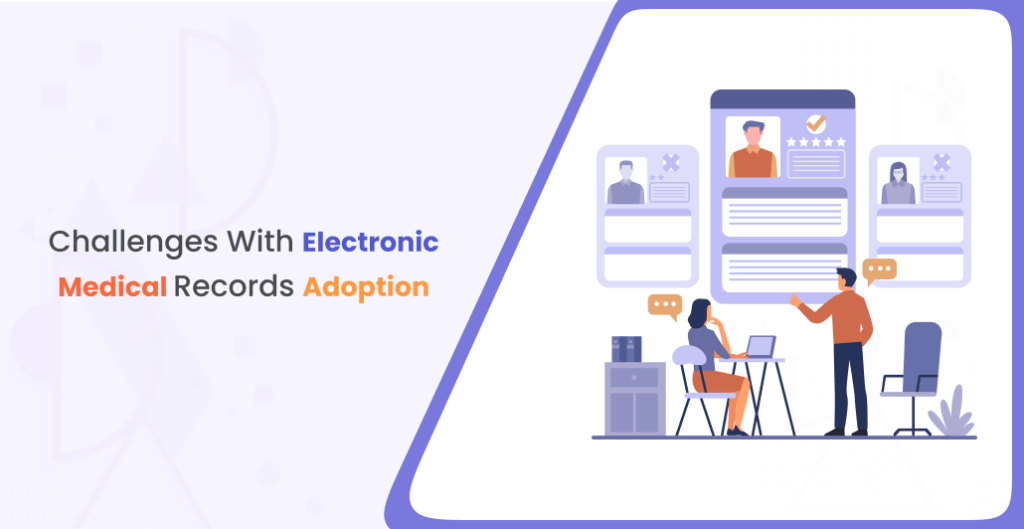|
Getting your Trinity Audio player ready...
|
Introduction:
EMR/EHR, software is among the most considerable software and has so many benefits through which hospitals can easily streamline the process and consider its implementation. However, the implementation of electronic medical records software is something that takes time to happen because it comes with so many challenges. Hospitals that have already considered electronic health records are somewhere aware of all the challenges and the strategies that they need to follow to overcome all of them. But still, there are so many hospitals that have yet to consider it and have certain doubts in their mind or are facing challenges during the implementation of electronic medical records software. If you also have the same thought, keep on reading because this article covers the challenges that can arise during the implementation of best electronic health records software. So, without further ado, let’s explore it in detail!
Challenges with electronic medical records adoption:
Here we discuss challenges with electronic medical record or any other Hospital Management System, adoption:
Unable to understand the interface:
The primary challenge with electronic medical records system adoption is that the hospital is not ready to get the software. They are unable to navigate the integrated features and, in the end, feel like they need to make the right investment. The understanding of features is necessary because knowing about the features is necessary to be able to understand how to use the software and what other benefits the hospital can get with its implementation.
Security challenges:
Challenges related to the security of Best AI-Enabled EMR In India are prominent. Undoubtedly, the data collected by hospitals is highly confidential, and hospitals cannot expect it to get exposed to any hacker or someone who can misuse it. With digital solutions implementation like EMR, hospitals have a significant concern. They are unable to determine the security of the software, and sometimes, this leads to many doubts ahead. Sometimes, there needs to be more clarity with encryption methods as well. Understanding encryption methods is necessary to mitigate security concerns.
Cost of the software:
The cost of the software is also a significant point of concern among hospitals. Many hospitals are still unsure about the cost of the software. The cost of the software is also a concerning factor due to the variations in prices seen across the market. Some vendors offer software packages, and some charge a lump sum amount. Hospitals must be sure about the price that they are paying for the software they are choosing.
Unable to get the training session:
Training sessions are also there from the side of the hospital. In some cases, the hospital does not have that much hands-on experience in technology, and that’s why they are unable to get online electronic medical records. The training sessions are very essential to go through because they will help you to understand how to use software and what are the features that are integrated in. The part of a training session of software provider is not coming up with dedicated training sessions. There is a possibility that the hospital will not be able to understand the software in detail.
Resistance to adopting technology:
In some cases, it happened at the hospital is not ready to accept the change that comes with electronic medical records in healthcare, which is why they need to prepare to focus on bringing out any new software on the table that can favor the operations inside the hospital. Technology is something that puts hospitals at the point where they are unable to get the software, and the resistance to change leads to many problems. Hospitals must be sure that the administration is ready to accept the changes that will take place with the implementation of electronic medical records so that they can be sure that the investment will be perfect.
Conclusion:
In conclusion, this was all about the challenges that are very common with the implementation of EMR Software In India.Hospitals need to make sure that everything is checked thoroughly to ensure that there are no issues when the software is implemented and that they are able to use all of its integrated capabilities.. Sometimes, it happens that the hospitals do not pay attention to the training session and, in the end, regret their decision to choose the software. If you want to avoid being part of the same situation, check on everything in detail and ask the software provider about the training sessions so that there will be clarity available to you regarding everything. Then you can get the software accordingly!
Addressing these hurdles requires collaborative efforts among stakeholders, including policymakers, healthcare providers, and technology developers, to develop standardised protocols, improve accessibility, prioritise data security, and provide adequate training and support. Overcoming these challenges is vital for realising the transformative potential of EMRs in modern healthcare delivery.


